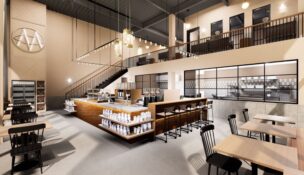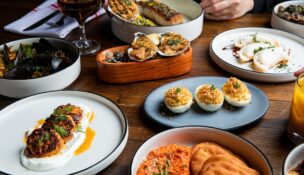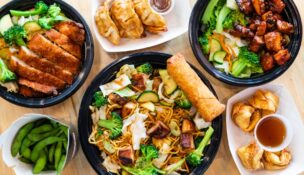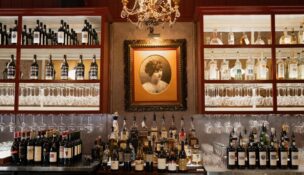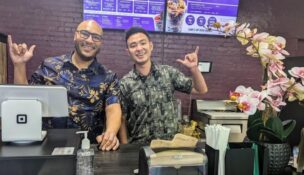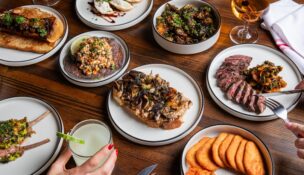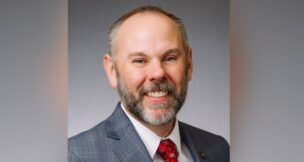Columbia businesses weathering COVID-19 storm
Melinda Waldrop //September 17, 2020//
Chad Elsey has been through a gamut of emotions during seven months unlike any he’s ever seen in his restaurant career.
“It probably comes in waves,” said Elsey, part of the ownership group behind South Carolina’s five Cantina 76 locations. “At first, it’s probably a little bit of fear and shock, and then you get a little used to it and it becomes just kind of a challenge, and then probably it becomes frustrating, and I think now it’s starting to become a way of life, unfortunately. But overall, I think everyone’s moving forward with a positive attitude.”
Elsey and other business owners up and down Columbia’s Main Street, as well as surrounding districts, have balanced their bottom lines with concern for the health of employees and customers as the COVID-19 pandemic has affected every aspect of daily retail life. After a statewide shutdown in March limited most restaurants to to-go only services, a gradual reopening that began late this spring has infused many establishments with some life and revenue, but things are far from back to normal.
“These are trying times, but people are — we’re getting through it,” Matt Kennell, CEO of downtown development organization City Center Partnership, said. “People are resilient. … People are going forward. People are not just burying their head in the — I wouldn’t say the sand, but the sidewalk, I guess. And they’re being creative.”
For many restaurants, that resiliency has included an emphasis on to-go offerings and outdoor dining as inside seating remains limited to 50% occupancy.
“We’re doing much more business than just traditional dine-in,” Eddie Wales, owner of Vista landmark Motor Supply Co. Bistro, said. “The takeout is something that a lot of customers still want. They don’t want to come in and sit inside, so it’s still available for them. We’ll get a good handful of orders, especially at the beginning of each shift at night. It really helps. It’s a small way that we’ve adjusted.”
Some businesses are going beyond adjusting. Rosewood local favorite Peebles Wing Shack is expanding to another location on Lincoln Street in the Vista, while Hampton Street Vineyard has reopened under new ownership in Main Street’s central business district.
“They’re starting to get busier and busier,” Abby Naas, executive director of The Vista Guild, said. “They’re definitely not at the point where they were in February or at this time last year, but it’s what you could expect with what’s happening. We’re just hoping that people continue to order their to-go and continue to come out and eat indoors or outdoors, just with their comfort level.”
There have been some casualties. Downtown boutique gift shop Uptown Gifts has closed, as has a Pita Pit located in the Arcade building at Main and Washington streets. Among scattered Five Points closings was longtime institution Yesterday’s, undergoing ownership changes before the pandemic, which permanently closed its doors in April.
But blocks away, a new pinball lounge, Bang Back, has opened, while the village also has a new deli lunch option in Enzo’s on Greene Street.
“I don’t think anybody thought we’d still be where we are when we were back in March, canceling St. Pat’s,” Kelsey Henninghan, executive director of the Five Points Association, said. “There’s a very positive vibe, not by any means to anything away from what all has happened, because it’s very unfortunate. But it has forced some of our businesses to think outside the box and out of their comfort zone.
“I’ve heard, and it’s nice to hear in a time where everybody’s having such difficulty, for businesses owners to be excited because now they have an online store and they’re seeing orders come through that. It might have been something that, had this not happened, they may not have added that avenue for customers. So I think that’s definitely a positive that’s come out of it. We try to find them where we can.”
Individual impact
Ben Adams can’t think of anything else he’d rather be doing.
Adams opened Odd Bird Books in the Arcade building in February. The pandemic has not been kind to a fledging business, but as Adams sees it, he’s better off than working for someone else like he was doing before.
“I’d be in an equally if not more precarious situation right now if I were still being paid hourly to work in somebody else’s bookstore,” Adams said.
Adams said the handful of walk-in customers he gets daily, combined with the deliveries he does after business hours (which include 10 a.m. to 6 p.m. on Saturdays), are “enough to keep the lights on,” and he noted that Odd Bird is not set up to be able to handle an incredibly busy downtown business scale.
“Even if things were bleak here, it would make no sense to try to look for a job or something else,” he said. “It does make sense to kind of hang out, and I feel like I can do that here.”
Across the Gervais Street bridge, Phill Blair has been even more fortunate. While the upscale downtown dive bar he co-owns, The Whig, has been closed since March, his new West Columbia venture, WECO Bottle & Biergarten, is going gangbusters.
The tap room and bottleshop has an expansive outdoor patio, including a large roofed section, that is full most days with locals enjoying the fresh air while seated six feet apart with no more than six people per table.
“It’s exactly what we wanted it to be, but that just happens to be something that’s really good for the climate,” said Blair, who opened WECO this spring.
Meanwhile, the Whig, a long-beloved subterranean haunt steps from the Statehouse, is not yet a feasible destination. Blair has been a vocal proponent of COVID safety measures, often speaking out about the issue on social media, more than once in response to outsiders who think The Whig could already be open. Inside his West Columbia bar, masks are required — as evidenced by signs plastered on the front door that also warn patrons to keep children at their tables —and there are no exceptions.
“There’s still people who just refuse to acknowledge any rules, but we don’t allow them to be here,” he said. “That’s the tradeoff. If you want a beer here, you will follow the rules, or you will go somewhere else.”
While WECO is serving libations, The Whig is undergoing renovations.
“We’re replacing the entire HVAC in the whole building to bring actual air into the space, which we haven’t had in a long time,” Blair said. “There’s all this stuff that we’re doing while we wait and see if case numbers go down.”
Blair said he hopes to begin offering to-go food and reservation-only seating at The Whig by November.
“We have a plan,” Blair said. “We’re not putting a hard date on reopening. … That (November) will be past Memorial Day weekend, past the ridiculous 20,000-person home (football) game we’re going to have in September. We’re going to see the fallout of all that before we open our doors again.”
Like Elsey and Wales, Blair said he has retained all staff members who want to stay, “which is critical, because we don’t want to be training people from scratch in this environment,” he said. But all three owners also admit the ongoing uncertainty is a mental drain.
“You can’t plan further than 30 days on,” Blair said. “For the first three or four months that The Whig was closed, we made a new plan every two weeks, then scrapped it.”
Elsey said that overall company revenue is down around 20%, “which, all things considered, isn’t really that bad.” Blair and Wales are also not feeling an undue financial strain currently, though the 50% capacity at which Motor Supply is currently operating is “not sustainable over an X amount of time,” Wales said.
“Even if we were allowed to open at 100%, I don’t know that the demand would be there at 100%, without business travelers and concerts and things like that down in the Vista,” Wales said. “We’re doing the best with what we’ve got, but that can only go so long. … It’s not profitable. It’s what we need to do to generate some revenue. … It’s just been a year of worry, just constant worrying, and so many decisions to make in the early-on days — when to open, how to open, what happens if employees start getting sick. You worry about getting sick yourself. Our customers are more sophisticated and they follow the rules, but some of the restaurants that have opened, people are refusing to wear masks and they’re having to police that. I feel for them.
“It’s just been a year of stress and worry, not just for selfish business reasons.”
Holding onto hope
At the corner of Main and Lady streets in downtown Columbia, hope is visible — spelled out in the large letters of a free-standing sign sponsored by City Center Partnership.
“I think it has inspired people,” Kennell said. “It’s been a very popular selfie spot. We were able to work with First Citizens and they made the land available to us to do it.”
Kennell tries to incorporate that philosophy into daily activities, taking heart that University of South Carolina students have returned to a Main Street bereft of usual community activities such as the popular First Thursday and Arts and Draughts gatherings at the Columbia Museum of Art.
Although COVID-19 cases have spiked at Greek organizations on campus and police have shut down overcrowded parties and bars since the students’ return, Kennell said the ebb and flow of the university semesters may have benefitted the central business district during the pandemic.
“It always gets slow in the summertime downtown. In fact, I think one reason that the Main Street retailers have held on as well as they have is they’re sort of used to business being slow in the summertime,” Kennell said.
“Now with the students back, hopefully the energy level will pick up, and I think you can already feel that, walking around downtown. … You can already feel the energy level, you can feel the volume knob turn up. They are walking around, they are spending money. The sidewalk tables at Cantina 76 are packed again. That should give us a boost.”
Another potential boost on the horizon is a much-anticipated second round of federal pandemic relief funding, still being hammered out on Capitol Hill.
“A lot of places like mine are kind of hoping that there’s going to be that second round in the next stimulus package,” Wales said. “What we had read was it was going to be a second round of PPP just for businesses that had done 50% or less revenue in the second quarter, which we and most places that would apply to, because for the entire month of April, we were closed. We were closed for eight weeks in total.
“That would make a big difference. They’re arguing over a lot of other things, but there’s no argument over that. We’ve just got to get to it. If that happens, we should be in good shape for the rest of the year. If that doesn’t happen, you’re going to see … not me; we’re in a stronger position than a lot of people, but I’m afraid you’ll see, come October, a lot of closings of restaurants and other small businesses.”
The Vista, where businesses also weathered civil unrest following protests after the death of George Floyd in May in Minneapolis, has also seen some closings. Uncle Willie’s bar and Sure Fire Tacos & Tortilla Grill closed early in the pandemic, though a new beer garden is set to open soon in the space formerly occupied by Flying Saucer, Naas said.
“We’ve also got a few more in the pipeline that are up-and-coming,” she said. “Everybody’s just kind of supporting each other the best that they can. Especially in our district, when we went through the riots, everybody kind of leaned in and helped each other, whether it was boarding up businesses or lending support: ‘Can I help you? Can we help pick up trash?’ We’re a fairly close-knit group, and so anything we could do to assist each other. I think that’s something that we’ll keep doing.”
While Wales navigates daily challenges, including a need for workers that he says most restaurant owners he knows shares, he also tries to maintain an upbeat mindset.
“When you see people come in, and you have half the tables in the dining room (full), that’s very encouraging, because there’s enough people that want to go out. That makes you feel good,” he said.
Wales said his restaurant, in business since 1989 and ranked fifth in Southern Living’s 2019 readers’ poll of the South’s best restaurants, isn’t going away.
“I always try to stay positive,” he said. “I do feel that people will always want to come out and have a good meal, and we’ll be OK eventually. We just need eventually to come a lot sooner than later.”
This article first appeared in the Sept. 14 print edition of the Columbia Regional Business Report.
-





